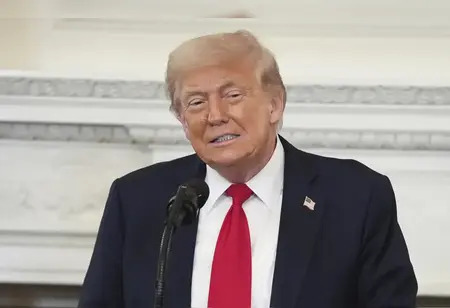
US, EU Announce a Sweeping Trade Deal that Imposes 15 Percent Tariffs


President Donald Trump and European Commission President Ursula von der Leyen have revealed an extensive trade agreement that establishes 15 percent tariffs on the majority of European products, averting Trump's warning of a 30 percent rate had no agreement been achieved by August 1.
Import taxes, or tariffs, imposed on European goods purchased by Americans may increase costs for US consumers and negatively impact profits for European firms and their associates that import these products.
Numerous specifics still need to be determined. The announcement by Trump and von der Leyen, made during Trump's trip to one of his golf resorts in Scotland, has various details yet to be clarified.
The key figure is a 15 percent tariff on 'the vast majority' of European products imported to the US, which encompasses cars, computer chips, and pharmaceuticals.
Also Read: Shubhanshu Shukla: Second Indian Astronaut to Turn the Space History Page
It's beneath the 20 percent Trump first suggested and less than his threats of 50 percent and subsequently 30 percent.
Von der Leyen stated that both parties reached an agreement on eliminating tariffs for a variety of "strategic" items: aircraft and aircraft components, specific chemicals, semiconductor machinery, selected agricultural goods, and various natural resources along with essential raw materials.
She mentioned that the two parties "would continue collaborating" to expand the product list.
Moreover, the EU would acquire what Trump claimed was $750 billion (638 billion euros) in natural gas, oil, and nuclear fuel to substitute for Russian energy, and Europeans would put in another $600 billion (511 billion euros) into the U.S.
Also Read: Spacetech Startups Propelling Modern Space Innovation
50 percent US tariff on steel stays and others might, too Trump said the 50 percent US tariff on imported steel would remain; von der Leyen said the two sides agreed to further negotiations to fight a global steel glut, reduce tariffs and establish import quotas - that is, set amounts that can be imported, often at a lower rate.
President Donald Trump and European Commission President Ursula von der Leyen have revealed an extensive trade agreement that establishes 15 percent tariffs on the majority of European products, averting Trump's warning of a 30 percent rate had no agreement been achieved by August 1. Import taxes, or tariffs, imposed on European goods purchased by Americans may increase costs for US consumers and negatively impact profits for European firms and their associates that import these products.
Numerous specifics still need to be determined. The announcement by Trump and von der Leyen, made during Trump's trip to one of his golf resorts in Scotland, has various details yet to be clarified.
The key figure is a 15 percent tariff on "the vast majority" of European products imported to the U.S., which encompasses cars, computer chips, and pharmaceuticals. It's beneath the 20 percent Trump first suggested and less than his threats of 50 percent and subsequently 30 percent.
Von der Leyen stated that both parties reached an agreement on eliminating tariffs for a variety of "strategic" items: aircraft and aircraft components, specific chemicals, semiconductor machinery, selected agricultural goods, and various natural resources along with essential raw materials. Details were insufficient.
She mentioned that the two parties "would continue collaborating" to expand the product list.
Moreover, the EU would acquire what Trump claimed was $750 billion (638 billion euros) in natural gas, oil, and nuclear fuel to substitute for Russian energy, and Europeans would put in another $600 billion (511 billion euros) into the U.S.
50 percent U.S. tariff on steel stays and others might, too Trump said the 50 percent US tariff on imported steel would remain; von der Leyen said the two sides agreed to further negotiations to fight a global steel glut, reduce tariffs and establish import quotas - that is, set amounts that can be imported, often at a lower rate.

